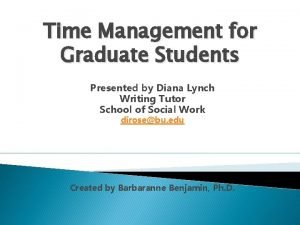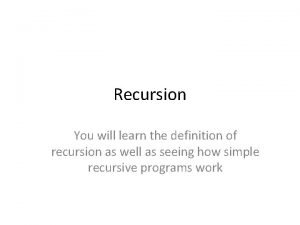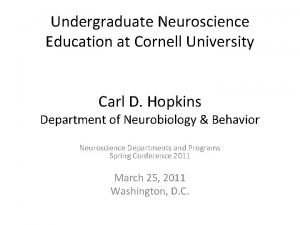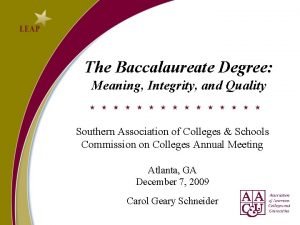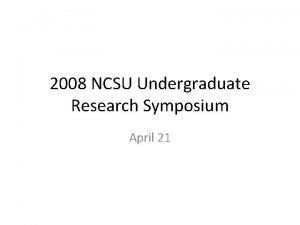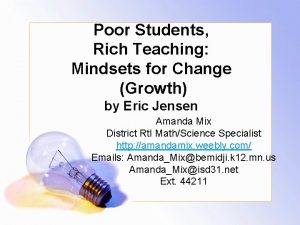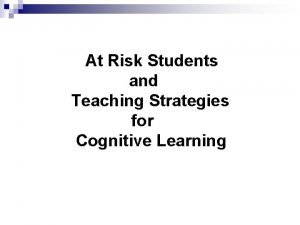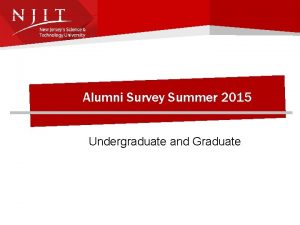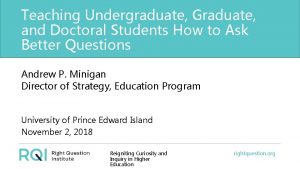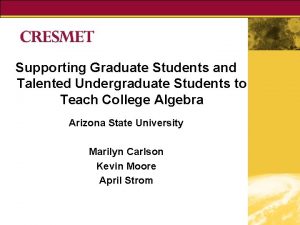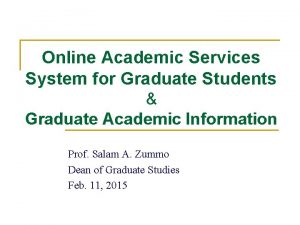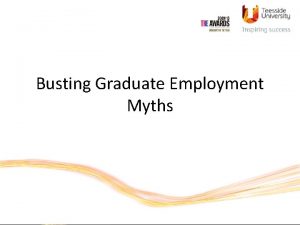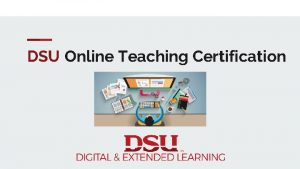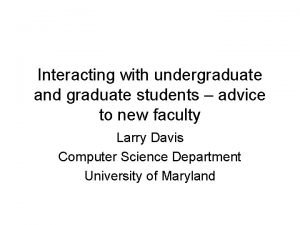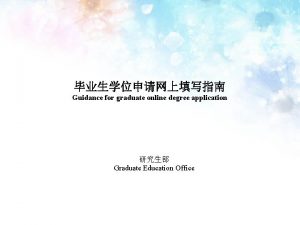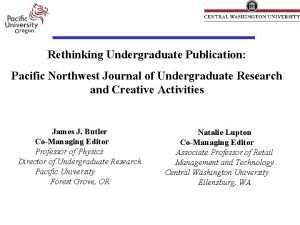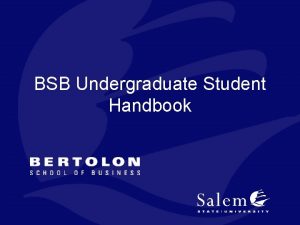Teaching Undergraduate Students versus Graduate Students Online Kelly




























- Slides: 28

Teaching Undergraduate Students versus Graduate Students Online Kelly Paynter & Jimmy Barnes Jacksonville State University

Teaching Undergraduate Students versus Graduate Students Online • Commonalities • Differences • Instructional Approaches

Pedagogical • The differences in undergraduate and graduate curricula are primarily the extent and complexity of course readings, the depth of discussions, and the difficulty of assignments • Undergraduate professors allow students to “get away with using more shallow processing strategies such as rehearsal and rote memorization” (Artino & Stephens, 2009, p. 150)

What Causes these Differences? • Characteristics of the students • Design of the courses • Either way, these differences must be addressed

Undergraduate Students • Traditionally • Ages 18 -23 • Full-time students • Modern undergraduates • May also include older, non-traditional students • Returning to further their education part-time • Some may be finishing degrees that were put on hold for life events • May have been inspired to get a baccalaureate degree later in their careers.

Professors • Must familiarize themselves with the populations at their institutions • Know to whom they are directing instruction

Undergraduates • Younger students find electronic classes more • • stimulating Accustomed to such environments their entire lives Completed more online courses in the past Having greater experience with online technologies Express likely intentions to enroll in future online courses (Artino & Stephens, 2009)

Factors Affecting Student Success • Nurturing school environment • Support of professors

Undergraduates • Differences in student learning styles and perceptions of the usefulness and ease of use of course-related technology affects the performance of undergraduate students more than graduate students (Arbaugh, 2010). • Undergraduates are more likely to accept the lecture format without questioning the content (Mc. Quiggan, 2011).

Undergraduates (cont. ) • Undergraduate students see the learning management system as mainly a repository of information and assignments (Arbaugh, 2010). • Undergrads may be more likely to procrastinate, especially the younger, traditional students (Artino & Stephens, 2009; Cao, 2012).

Graduate Students • Generally thought of as older, more established adults who have some professional work experience. • Some programs, however, more likely to recruit students directly from the undergraduate degree. • Instructors must make a point of investigating their audience before making assumptions about the age and experience lever of the student population.

Characteristics Affecting Graduate Student Success • Mentorship • Group support • Student-student interaction, instructor facilitation and interaction in class discussions, the use of student groups, and assignment variety is more likely to affect the performance of graduate students (Arbaugh, 2010)

Graduate Learning Environment • Involving graduate students in learning process is extremely helpful in meeting student expectations and convincing students that the class will help in their current/future jobs. • Graduate students perform better on homework assignments than their undergraduate counterparts • Graduate students realize the quantitative value toward their final grade versus undergraduates • More mature and disciplined

Graduate View of Learning Management System • Graduate students view the learning management system as a way to communicate with others (Arbaugh, 2010). • Graduate students are less accepting of the lecture format to present course content; they also want to hear professors’ experiences and benefit from their personal expertise and knowledge (Mc. Quiggan, 2011). • Graduate students also wish to share their own experiences and work successes. • This population is not immune to procrastination

Personal Observations • Undergraduates usually need more explicit step-by-step directions regarding procedures • Undergraduate students also tend to need more personalized attention and one to one communication. • Designing courses so that students interact with each other on a regular basis is also critical to the success of the online learning environment.

Personal Observations • If students feel like they are a part of a learning community they will be more likely to participate in course activities and they have a higher rate of successfully course completion. • Feeling that they are a part of a class also helps with a problem that plagues all levels of higher education, dropping out.

Attendance • Undergraduate students seem especially prone to “vanish” from courses and not communicate or respond to the professor. • This population generally benefits from fairly strict attendance and late policies, since they may still be experimenting with the perceived freedom of college and adulthood in general.

Attendance (cont. ) • Online classes and meetings should require the same prompt attendance at all online meetings that one would normally expect from students in a traditional classroom setting. • Students must also be required to regularly participate in all online course activities to ensure that they are making satisfactory progress.

Graduate Vs. Undergraduate • Undergraduate students are normally full-time students, graduate students are usually returning to pursue a higher degree. • Undergraduate students are trying to start a career while graduate students are pursuing a degree while they simultaneously pursue their chosen career. • Graduate students generally seem to ask for extensions, exceptions, and special circumstances more often than undergraduates.

Graduate Vs. Undergraduate (cont. ) • Graduate students seem to do better with locating, reading, digesting, and asking questions about the syllabus and course assignments. • Undergraduates are generally fairly passive concerning course schedules and matters referring to the course syllabus. • Generally the professors have more lenient late and attendance policies for graduate students. • Undergraduates will frequently wait until the last minute to turn in work, so having brief acceptable late periods encourages them to submit outstanding assignments in a timely manner.

Graduate vs. Undergraduate (cont. ) • Graduate students, on the other hand, seem to have many more scheduling conflicts and will often ask for additional time to complete coursework because of scheduling conflicts. • Graduate students normally place a higher priority on submitting quality schoolwork and will generally turn in late work after the unusual circumstances in their lives have normalized. • Graduate students also seem to place more emphasis on the rubrics and tend to question points deducted from assignments more than undergraduates.

Tips from the Research Providing detailed feedback (through allowing draft submissions of major assignments, among other examples) and explaining the purpose of each assignment were seen as equally beneficial by graduate and undergraduate students (Mc. Quiggan, 2011)

Tips from the Research (cont. ) All populations need assistance and training with learning the course management system, online class procedures, and technical issues. “Assuming today’s undergraduate and graduate populations are capable of moving onto ‘online’ experiences without proper training is a mistake…Student perceptions are a critical factor to consider and should not be taken lightly” (Fish, 2013, p. 65).

Tips from the Research (cont. ) Professors should consider the maturity and ability levels for the students that they teach. Instructors moving from one level to another for the first time, especially, must be careful to avoid asking too much or too little from the students.

Tips from the Research (cont. ) It is recommended that students turn in assignments via stages, so that feedback can be given along the way and the likelihood of task completion is greater. For both populations, Artino and Stephens (2009) recommend encouraging students to identify and set challenging, but realistic goals. They also reiterate that professors should provide quick, explicit, and helpful feedback on assignments.

Tips from the Research (cont. ) Instructors should make their presence known consistently, such as demonstrating appropriate discussion board posts, encouraging (or requiring) student participation, helping to resolve class disagreements in a respectful fashion, asking students to explain and expand their viewpoints, and correcting any misassumptions that may arise.

Questions ?

Selected References • Arbaugh, J. B. (2010). Do undergraduates and MBAs differ online? : Initial conclusions from the literature. Journal of Leadership & Organizational Studies, 17(2), 129+. • Artino, A. J. , & Stephens, J. M. (2009). Academic motivation and self- regulation: A comparative analysis of undergraduate and graduate students learning online. Internet and Higher Education, 12(3 -4), 146 -151. • Cao, L. (2012). Differences in procrastination and motivation between undergraduate and graduate students. Journal of the Scholarship of Teaching & Learning, 12(2), 39 -64. • Fish, L. A. (2013). A comparison of undergraduate versus graduate student perceptions and performance using online homework in Introduction to Operations Management courses. Business Education Innovation Journal, 5(1), 58 -66. • Mc. Quiggan, C. A. (2011). Preparing to teach online as transformative faculty development (Order No. 3471829). Available from Pro. Quest Central. (887709387).
 Seoul university acceptance rate
Seoul university acceptance rate Time management for graduate students
Time management for graduate students Nau graduate college
Nau graduate college Undergraduate meaninh
Undergraduate meaninh Portland state university undergraduate tuition and fees
Portland state university undergraduate tuition and fees Ics academic year plan
Ics academic year plan Definition of undergraduate student
Definition of undergraduate student Undergraduate research conference nyu
Undergraduate research conference nyu Difference between postgraduate and undergraduate
Difference between postgraduate and undergraduate Difference between postgraduate and undergraduate
Difference between postgraduate and undergraduate Cornell nbb
Cornell nbb Los angeles city college undergraduate enrollment
Los angeles city college undergraduate enrollment Acadia university undergraduate programs
Acadia university undergraduate programs University of southern california undergraduate
University of southern california undergraduate Fsu undergraduate studies
Fsu undergraduate studies Csub nursing program
Csub nursing program Baccalaureate degree meaning
Baccalaureate degree meaning Acu undergraduate research festival
Acu undergraduate research festival Temple university undergraduate bulletin
Temple university undergraduate bulletin Acu copycat
Acu copycat Usc computational neuroscience
Usc computational neuroscience King's undergraduate research fellowship
King's undergraduate research fellowship Unb undergraduate calendar
Unb undergraduate calendar Ncsu undergraduate research symposium
Ncsu undergraduate research symposium Differences between micro teaching and traditional teaching
Differences between micro teaching and traditional teaching Relational mindset
Relational mindset Survivors teaching students
Survivors teaching students Teaching at risk students
Teaching at risk students Teaching web design to high school students
Teaching web design to high school students

